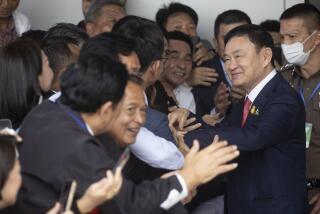Sihanouk Takes Lead of Regime in Cambodia
- Share via
PHNOM PENH, Cambodia — Prince Norodom Sihanouk, the leading actor in Cambodia’s history for the past 50 years, announced Thursday that he will lead a new government uniting the Vietnamese-installed Phnom Penh regime and the opposition royalist party, foes in 14 years of civil war.
The 70-year-old Sihanouk said in a statement that he will become Cambodia’s head of state, prime minister and commander in chief of the armed forces. He appointed his son, Prince Norodom Ranariddh, leader of the opposition party, and Hun Sen, the prime minister of the Phnom Penh government, to serve as deputy prime ministers.
Describing himself as the “father of the nation, the father of national unity and the father of national reconciliation,” Sihanouk declared: “Our people have suffered greatly and unjustly for the past 23 years. No one has the right to make them suffer any more.”
Sihanouk’s moves were clearly a compromise designed to avert a resumption of civil war. The Phnom Penh regime threatened earlier this week to reject the results of six days of U.N.-organized national voting as it became clear that it had suffered a significant defeat.
Sihanouk’s dramatic announcement appeared to have surprised officials of the U.N. Transitional Authority in Cambodia (UNTAC), who deployed 22,000 troops and civilian officials at a cost of $2.6 billion to arrange democratic elections last week.
It was clear that UNTAC was not consulted. Sihanouk did not mention the agency in his statement and only informed its chief, Yasushi Akashi, of the new “national government of Cambodia” at 5:30 p.m., when the old government was dissolved.
Describing the agreement as “extremely important,” Akashi said in a statement that a “new mechanism could be a necessary instrument for stability in Cambodia.”
But one UNTAC official, who asked to remain anonymous, commented: “We spent all that time and money and the country returns to feudalism. Well, it’s their country after all.”
The announcement also appeared to have come as a surprise to officials of FUNCINPEC, as the main opposition party is known.
They said they were unaware of the compromise plan until it was publicly proclaimed. But Sihanouk said he had received the “clear agreement and unconditional support” of Ranariddh, who was in Bangkok, Thailand.
The Cambodian People’s Party, the political movement of the Phnom Penh government, issued a statement supporting the interim government for the sake of “peace, national reconciliation and national reconstruction.”
Khieu Kanarith, a spokesman for the outgoing government, called on the armed forces and other civil servants to remain calm.
He said the government had received reports of potential unrest in the country after the announcement of the election results.
Nearly final returns in the elections showed that FUNCINPEC had won 45% of the popular vote, compared to 38% for the Cambodian People’s Party.
A second opposition party, the Buddhist Liberal Democratic Party, trailed with a distant 3%.
According to preliminary estimates, the voting should give FUNCINPEC about 57 seats in the 120-seat Constituent Assembly, with the Cambodian People’s Party receiving 52 seats and the Buddhist party getting about 10 seats.
Under the U.N.-brokered peace plan achieved in October, 1991, the Constituent Assembly has three months to draft a new constitution and form the new government. UNTAC is supposed to remain during the transition period.
While FUNCINPEC came out the winner, it failed to garner a two-thirds majority, even in coalition with the Buddhist party, which is necessary to adopt a constitution.
The Phnom Penh regime has enough seats to block any charter proposals, and it also controls the only functioning army in the country, its most potent bargaining chip.
But the political power-sharing deal between the Phnom Penh regime and Sihanouk may mean that they can reach quick agreement on a constitution and opt simply to continue the interim arrangements on a more permanent basis.
Named in 1991 as the head of state by the Supreme National Council, a body composed of the four warring factions in Cambodia’s civil war, Sihanouk was not a candidate in last week’s national elections.
He had been expected to run for president unopposed after the drafting of a new constitution.
As the magnitude of its defeat became clear early this week, the Phnom Penh government called on the United Nations to hold fresh elections in four provinces because of irregularities in the voting.
But at the same time, Chea Sim, the head of the Cambodian People’s Party, began two days of secret negotiations with Sihanouk that resulted in Thursday’s formation of the interim government.
Cambodian People’s Party spokesman Sok An indicated Thursday that his party is prepared to accept the results of the elections and take its place in the Constituent Assembly.
But he insisted that voting irregularities had cost his party the elections.
Sihanouk said in his statement that he still recognizes the Khmer Rouge guerrilla movement, which boycotted the elections, and still considers its leaders, Khieu Samphan and Son Sen, as members of the national reconciliation body set up by the 1991 Paris peace agreements.
More to Read
Sign up for Essential California
The most important California stories and recommendations in your inbox every morning.
You may occasionally receive promotional content from the Los Angeles Times.












